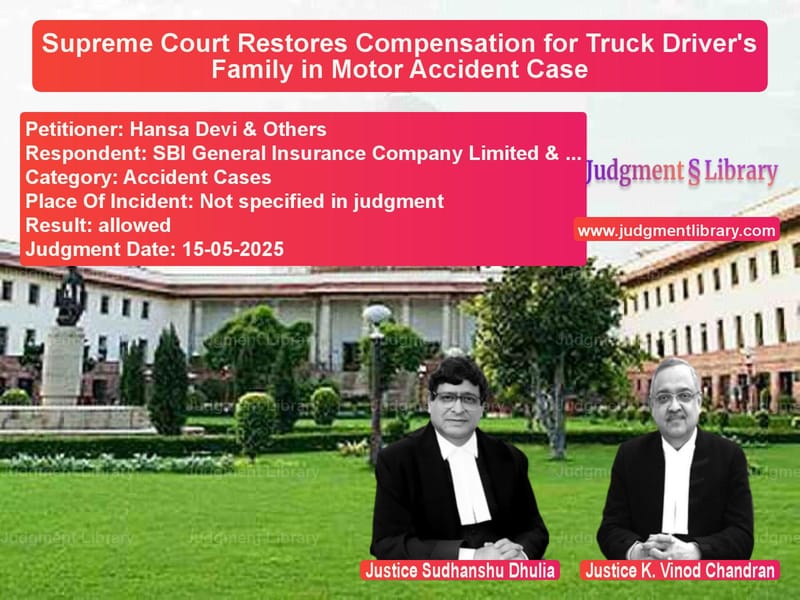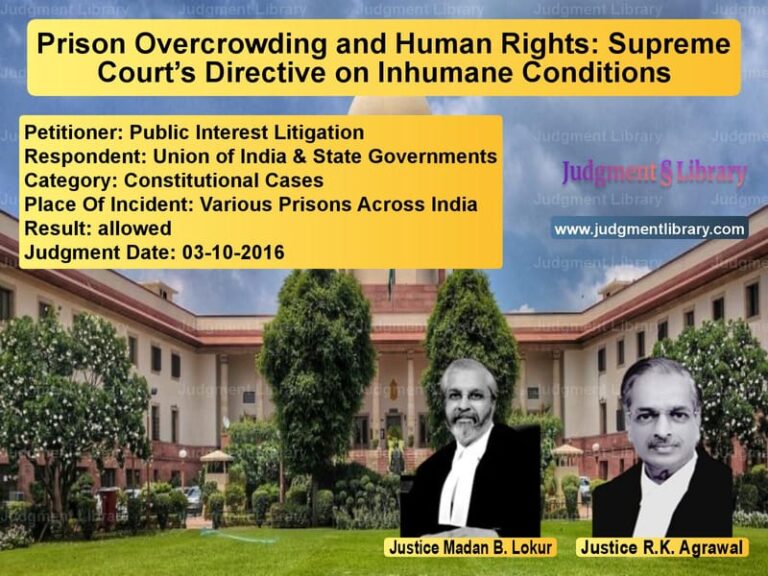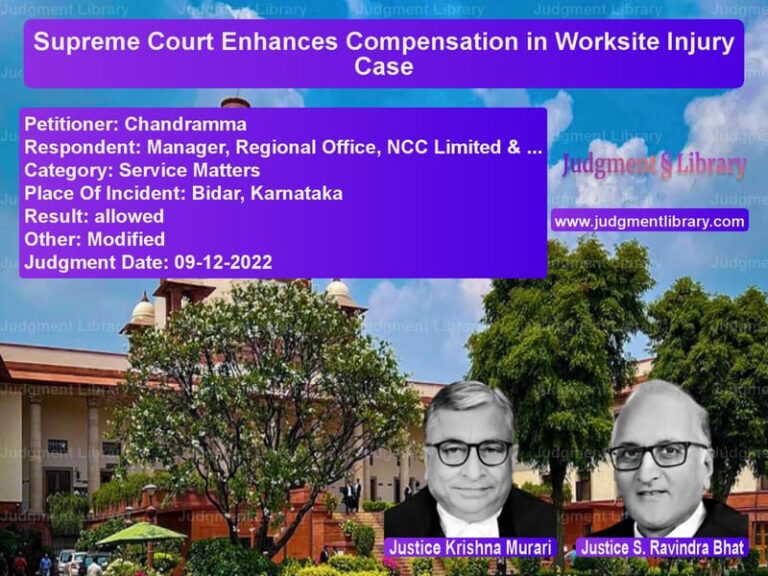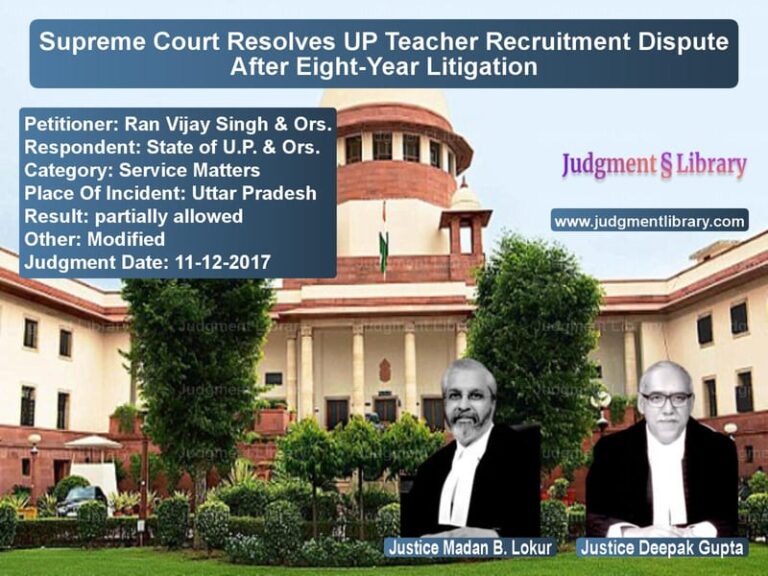Supreme Court Restores Compensation for Truck Driver’s Family in Motor Accident Case
In a significant judgment that brings relief to families who have lost their breadwinners in road accidents, the Supreme Court of India has restored the full compensation amount for the family of a 28-year-old truck driver who died in a tragic accident. The case of Hansa Devi & Others versus SBI General Insurance Company Limited & Another represents a crucial intervention by the apex court to ensure that bereaved families receive fair compensation, especially when lower courts have unjustly reduced the amounts awarded to them.
The heart-wrenching story begins with a young truck driver, the sole breadwinner for his family, who met with a fatal accident while performing his duties. He had just parked his truck and was in the process of boarding it when another truck, driven rashly and negligently, hit him, resulting in his instantaneous death. Left behind were his young widow, three minor children, and his elderly parents—all dependent on his income for their survival and future.
The legal journey that followed this tragedy took the family through multiple judicial forums, each with varying outcomes that significantly impacted the compensation they would receive. What makes this case particularly important is how it addresses two critical aspects of motor accident compensation claims: the determination of income for calculating compensation, and the recognition of loss of consortium for all dependent family members, not just the spouse.
The Tragic Accident and Initial Proceedings
The fatal accident occurred on May 8, 2014, cutting short the life of a 28-year-old truck driver who was in the prime of his life. The helper/cleaner who was traveling with him witnessed the tragic incident and immediately rushed him to the hospital. This helper, who later appeared as PW2 before the Motor Accidents Claims Tribunal, also provided the First Information Statement that led to the registration of an FIR, establishing the facts of the case and the negligence of the other truck driver.
The deceased’s family—comprising his widow Hansa Devi, three minor children, and parents—filed a claim before the Tribunal seeking compensation for the loss of their breadwinner. The Tribunal, after examining the evidence and circumstances, awarded a total compensation of Rs. 23,07,000 to the dependents. The Tribunal accepted the claimed salary of Rs. 10,000 per month for the deceased, who was a driver of a heavy vehicle. From this amount, the Tribunal deducted one-third for personal expenses while adding future prospects calculated as three-fourths of 40% of the income.
In addition to the compensation for loss of income, the Tribunal awarded amounts for various other heads. The wife was granted Rs. 40,000 for loss of consortium, while each of the three children received Rs. 25,000 each for the same. The parents were awarded Rs. 10,000 each for loss of consortium. Funeral expenses and loss of estate were also compensated at Rs. 15,000 each. This comprehensive award represented the Tribunal’s assessment of the total loss suffered by the family due to the untimely death of their earning member.
The High Court’s Drastic Reduction
The relief that the family might have felt after the Tribunal’s award was short-lived, as the insurance company filed an appeal before the High Court. The High Court, in its decision, made substantial deductions to the compensation amount, particularly concerning the income assessment and the loss of consortium components.
The High Court reduced the income of the deceased from Rs. 10,000 per month to just Rs. 4,076, basing this figure on the minimum wages for a driver at Rs. 5,434 with 40% future prospects. This drastic reduction in the assessed income formed the basis for recalculating the entire compensation amount. Furthermore, the High Court significantly curtailed the compensation for loss of consortium, granting only Rs. 40,000 in total for this head, unlike the Tribunal which had awarded separate amounts to the wife, children, and parents.
As a result of these changes, the total compensation amount was reduced from Rs. 23,07,000 to just Rs. 12,34,105—a reduction of nearly Rs. 11 lakhs. For a family that had already lost its primary earner, this reduction represented a substantial financial setback and added to their emotional trauma.
The Supreme Court’s Intervention
Faced with this significant reduction in compensation, the legal representatives of the deceased approached the Supreme Court through a Special Leave Petition. The case came before a bench comprising Justice Sudhanshu Dhulia and Justice K. Vinod Chandran, with Justice Chandran authoring the judgment.
The Supreme Court, in its analysis, found no justification for the High Court’s reduction of the income figure. The Court made a significant observation about income assessment in accident cases, particularly for workers in the unorganized sector who may not have formal documentation of their earnings. Justice Chandran, writing for the bench, referred to the precedent set in Ramachandrappa v. Royal Sundaram Alliance Insurance Co. Ltd, where the Court had held that even a coolie would get an income of Rs. 4,500 in the year 2004.
The Court applied logical reasoning to determine what would be a fair income assessment for the year 2014, when the accident occurred. The judgment states: “Hence, an unskilled labourer considering the marginal and incremental increase in each successive year @ Rs.500/- per year would be entitled to get almost Rs.10,000/- in the year 2014.” Based on this calculation, the Court concluded that “the claim made before the Tribunal with respect to the driver of heavy vehicle getting Rs.10,000/- as wages per month must be necessarily accepted.”
This reasoning is particularly important as it acknowledges the reality of wage growth and inflation, ensuring that compensation calculations keep pace with economic changes rather than being stuck with outdated figures.
Recognition of Consortium for All Dependents
Another significant aspect of the Supreme Court’s judgment concerns the compensation for loss of consortium. While the Tribunal had awarded separate amounts for loss of consortium to the wife, children, and parents, the High Court had substantially reduced this component, granting only Rs. 40,000 in total.
The Supreme Court restored the Tribunal’s award on this aspect, relying on the precedent set in New India Assurance Company v. Somwati and Ors. The Court explicitly stated: “Insofar as the loss of consortium, it has been held in New India Assurance Company v. Somwati and Ors. that even the children and the parents are entitled to compensation for loss of consortium.”
This recognition is crucial as it acknowledges that the loss of a family member affects all dependents, not just the spouse. Children lose the care, guidance, and affection of a parent, while parents lose the support and companionship of their child. By affirming that all these relationships deserve recognition in compensation awards, the Supreme Court has adopted a more holistic and humane approach to assessing the true impact of accidental deaths on families.
Restoration of Tribunal’s Award
After analyzing both aspects of the case—the income assessment and the loss of consortium—the Supreme Court found no merit in the High Court’s reduction of the compensation amount. The Court noted that since the claimants had not filed an appeal from the Tribunal’s award, there was no need for enhancement of the compensation. However, the Court emphasized that the award made by the Tribunal for loss of consortium to the children and parents had to be retained.
Based on this reasoning, the Supreme Court “set aside the order of the High Court restoring the order of the Tribunal.” This meant that the original compensation amount of Rs. 23,07,000 awarded by the Tribunal, along with applicable interest, was reinstated.
The Court also provided specific directions for the disbursement of the compensation amount, demonstrating its concern for the welfare of the family, particularly the minor children. The judgment states: “The amounts, with interest, as awarded by the Tribunal shall be disbursed to the claimants within a period of two months, which shall be equally apportioned in the name of the wife, children and parents.”
Showing particular sensitivity to the needs of the minor children, the Court added: “If any of the minor children have not attained majority, the amount shall be kept in a fixed deposit, the interest of which can be disbursed to the mother who is the guardian.” This direction ensures that the children’s share of the compensation is protected and used for their benefit until they reach adulthood.
The Court also set a clear timeline for the insurance company to comply with the order: “The insurance company shall deposit the amounts within the period stipulated before the Tribunal and the Tribunal shall apportion the amounts as directed hereinabove.”
Broader Implications of the Judgment
The Supreme Court’s judgment in this case has several important implications for motor accident compensation claims in India. First, it reinforces the principle that courts should take a realistic and pragmatic approach when assessing the income of victims, particularly those in the unorganized sector who may not have formal proof of income. The Court’s method of calculating income based on reasonable annual increments provides a fair and logical framework for such assessments.
Second, the judgment affirms the expanded understanding of loss of consortium beyond just the spouse to include children and parents. This recognizes the multidimensional nature of family relationships and the multiple losses that occur when a family member dies in an accident.
Third, the judgment demonstrates the Supreme Court’s role as a protector of the rights of vulnerable sections of society. By intervening to restore the compensation that had been drastically reduced by the High Court, the Court ensured that a bereaved family received the financial support they needed and deserved.
Finally, the detailed directions for disbursement, particularly the protection of minors’ shares through fixed deposits, shows the Court’s concern for the practical implementation of its orders and the long-term welfare of affected families.
Conclusion
The Supreme Court’s decision in Hansa Devi & Others versus SBI General Insurance Company Limited & Another represents a significant step toward ensuring justice for families who have lost their breadwinners in road accidents. By restoring the full compensation amount awarded by the Tribunal, the Court has not only provided relief to one grieving family but has also set important precedents for similar cases across the country.
The judgment balances legal principles with humane considerations, acknowledging both the financial and emotional losses suffered by accident victims’ families. It sends a clear message that courts should adopt a realistic and compassionate approach when determining compensation, particularly for families from humble backgrounds who may not have the resources to fight lengthy legal battles.
As road accidents continue to claim thousands of lives in India each year, this judgment serves as an important reminder of the judiciary’s responsibility to ensure that bereaved families receive fair compensation that adequately reflects their loss and helps them rebuild their lives. The Supreme Court’s intervention in this case reaffirms the constitutional promise of justice for all, particularly for those who need it the most.
Petitioner Name: Hansa Devi & Others.Respondent Name: SBI General Insurance Company Limited & Another.Judgment By: Justice Sudhanshu Dhulia, Justice K. Vinod Chandran.Place Of Incident: Not specified in judgment.Judgment Date: 15-05-2025.Result: allowed.
Don’t miss out on the full details! Download the complete judgment in PDF format below and gain valuable insights instantly!
Download Judgment: hansa-devi-&-others-vs-sbi-general-insuranc-supreme-court-of-india-judgment-dated-15-05-2025.pdf
Directly Download Judgment: Directly download this Judgment
See all petitions in Road Accident Cases
See all petitions in Compensation Disputes
See all petitions in Motor Vehicle Act
See all petitions in Negligence Claims
See all petitions in Insurance Settlements
See all petitions in Judgment by Sudhanshu Dhulia
See all petitions in Judgment by K. Vinod Chandran
See all petitions in allowed
See all petitions in supreme court of India judgments May 2025
See all petitions in 2025 judgments
See all posts in Accident Cases Category
See all allowed petitions in Accident Cases Category
See all Dismissed petitions in Accident Cases Category
See all partially allowed petitions in Accident Cases Category







